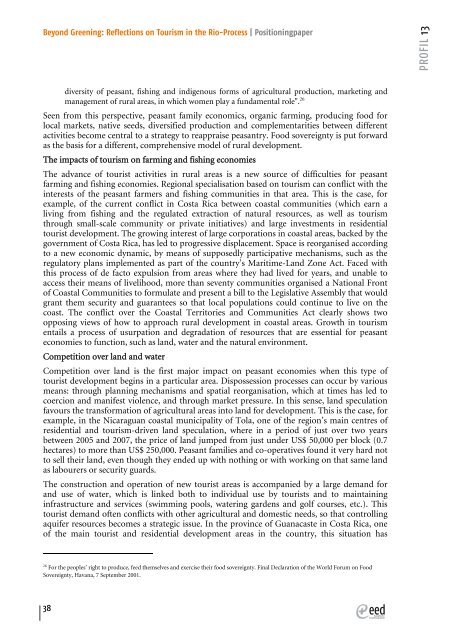Beyond Greening - Tourism Watch
Beyond Greening - Tourism Watch
Beyond Greening - Tourism Watch
Create successful ePaper yourself
Turn your PDF publications into a flip-book with our unique Google optimized e-Paper software.
<strong>Beyond</strong> <strong>Greening</strong>: Reflections on <strong>Tourism</strong> in the Rio-Process | Positioningpaperdiversity of peasant, fishing and indigenous forms of agricultural production, marketing andmanagement of rural areas, in which women play a fundamental role". 26Seen from this perspective, peasant family economics, organic farming, producing food forlocal markets, native seeds, diversified production and complementarities between differentactivities become central to a strategy to reappraise peasantry. Food sovereignty is put forwardas the basis for a different, comprehensive model of rural development.The impacts of tourism on farming and fishing economiesThe advance of tourist activities in rural areas is a new source of difficulties for peasantfarming and fishing economies. Regional specialisation based on tourism can conflict with theinterests of the peasant farmers and fishing communities in that area. This is the case, forexample, of the current conflict in Costa Rica between coastal communities (which earn aliving from fishing and the regulated extraction of natural resources, as well as tourismthrough small-scale community or private initiatives) and large investments in residentialtourist development. The growing interest of large corporations in coastal areas, backed by thegovernment of Costa Rica, has led to progressive displacement. Space is reorganised accordingto a new economic dynamic, by means of supposedly participative mechanisms, such as theregulatory plans implemented as part of the country’s Maritime-Land Zone Act. Faced withthis process of de facto expulsion from areas where they had lived for years, and unable toaccess their means of livelihood, more than seventy communities organised a National Frontof Coastal Communities to formulate and present a bill to the Legislative Assembly that wouldgrant them security and guarantees so that local populations could continue to live on thecoast. The conflict over the Coastal Territories and Communities Act clearly shows twoopposing views of how to approach rural development in coastal areas. Growth in tourismentails a process of usurpation and degradation of resources that are essential for peasanteconomies to function, such as land, water and the natural environment.Competition over land and waterCompetition over land is the first major impact on peasant economies when this type oftourist development begins in a particular area. Dispossession processes can occur by variousmeans: through planning mechanisms and spatial reorganisation, which at times has led tocoercion and manifest violence, and through market pressure. In this sense, land speculationfavours the transformation of agricultural areas into land for development. This is the case, forexample, in the Nicaraguan coastal municipality of Tola, one of the region’s main centres ofresidential and tourism-driven land speculation, where in a period of just over two yearsbetween 2005 and 2007, the price of land jumped from just under US$ 50,000 per block (0.7hectares) to more than US$ 250,000. Peasant families and co-operatives found it very hard notto sell their land, even though they ended up with nothing or with working on that same landas labourers or security guards.The construction and operation of new tourist areas is accompanied by a large demand forand use of water, which is linked both to individual use by tourists and to maintaininginfrastructure and services (swimming pools, watering gardens and golf courses, etc.). Thistourist demand often conflicts with other agricultural and domestic needs, so that controllingaquifer resources becomes a strategic issue. In the province of Guanacaste in Costa Rica, oneof the main tourist and residential development areas in the country, this situation has26For the peoples’ right to produce, feed themselves and exercise their food sovereignty. Final Declaration of the World Forum on FoodSovereignty, Havana, 7 September 2001.38












